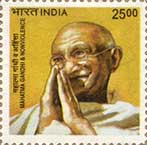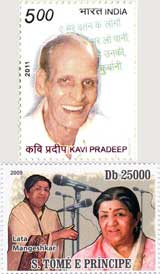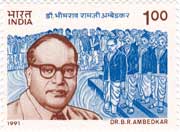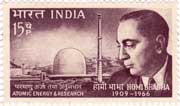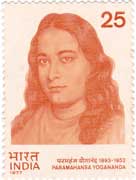Themes & Thoughts of the day : January
| 30 January : Mahatma Gandhi death anniversary | ||||
“Seven Deadly Sins Indian nationalist leader Mohandas Karamchand Gandhi, more commonly known as Mahatma Gandhi, was born on 2nd October, 1869, in Porbandar. He studied law in London, England, but in 1893 went to South Africa, where he spent 20 years opposing discriminatory legislation against Indians. As a pioneer of Satyagraha, or resistance through mass non-violent civil disobedience, he became one of the major political and spiritual leaders of his time. Satyagraha remains one of the most potent philosophies in freedom struggles throughout the world today. He was assassinated on 30th January, 1948. |
||||
| 28 January : Lala Lajpat Rai birth anniversary | ||||
"If I had the power to influence Indian journals, I would have the following headlines printed in bold letters on the first page: Milk for the infants , Food for the adults and Education for all." - Lala Lajpat Rai Lala Lajpat Rai (b. 28 January 1865 – d. 17 November 1928) was an author and politician who is chiefly remembered as a leader of independence movement. He was popularly known as Punjab Kesari meaning The Lion of Punjab also known as "Sher-E- Punjab" in Hindi. He was part of the Lal Bal Pal trio. He wasalso associated with activities of Punjab National Bank and Lakshmi Insurance Company in their early stages. He sustained serious injuries by the police when leading a non-violent protest against the Simon Commission and died less than three weeks later. |
||||
| 27 January : 'Aye Mere Watan Ke Logo...' sung by Lata Mangeshkar. | ||||
"Love is just a part of life and the love written about today talks about love between the sexes only. But do young men and women have a monopoly where love is concerned. Aren't there different kinds of love that between a mother and her children, between a father and his children, between a bhakt (devotee) and his deity, between a man and his motherland? I chose to write about all these different kinds of love." - Kavi Pradeep "Aye Mere Watan Ke Logo" ("O! the people of my country!") is a Hindi patriotic song written by Kavi Pradeep and composed by C. Ramchandra commemorating Indian soldiers who died during the Sino-Indian War. Kavi Pradeep was reportedly moved to compose the song by accounts of casualties of the war. The song was famously performed live on 27th January, 1963 by Lata Mangeshkar at a function in Delhi where India's first Prime Minister Jawaharlal Nehru and other dignitaries were present, just two months after the end of the war. This year it marks 51 years of the song. |
||||
| 26 January : Republic Day of India. | ||||
"I feel that the constitution is workable, it is flexible and it is strong enough to hold the country together both in peacetime and in wartime. Indeed, if I may say so, if things go wrong under the new Constitution, the reason will not be that we had a bad Constitution. What we will have to say is that Man was vile." - B. R. Ambedkar. The Constitution of India was passed by the Constituent Assembly of India on 26th November 1949 but was adopted on 26th January 1950 with a democratic government system, completing the country's transition toward becoming an independent republic. 26 January was selected for this purpose because it was this day in 1930 when the Declaration of Indian Independence (Purna Swaraj) was proclaimed by the Indian National Congress. Bhimrao Ramji Ambedkar, popularly known as Babasaheb was principal architect of the Constitution of India. |
||||
| 25 January : Michael Madhusudan Dutt birth anniversary. | ||||
Michael Madhusudan Dutt, (b. 25 January 1824 - d. 29 June 1873) was a popular 19th century Bengali poet and dramatist. He was born in Sagordari, a village in Keshabpur Upazila, Jessore District, Bengal Presidency, East Bengal (now in Bangladesh). He was a pioneer of Bengali drama. His famous work Meghnad Bodh Kavya is a tragic epic. It consists of nine cantos and is exceptional in Bengali literature both in terms of style and content. He also wrote poems about the sorrows and afflictions of love as spoken by women. |
||||
| 24 January : Homi Jehangir Bhabha death anniversary. | ||||
"I know quite clearly what I want out of my life. Life and my emotions are the only things I am conscious of. I love the consciousness of life and I want as much of it as I can get. But the span of one's life is limited. What comes after death no one knows. Nor do I care. Since, therefore, I cannot increase the content of life by increasing its duration, I will increase it by increasing its intensity. Art, music, poetry and everything else … I do have this one purpose - increasing the intensity of my consciousness of life." - Homi Jehangir Bhabha. Homi Jehangir Bhabha, FRS (b. 30 October 1909 – d. 24 January 1966) was an Indian nuclear physicist and the chief architect of the Indian atomic energy program. He was also responsible for the establishment of two well-known research institutions, the Tata Institute of Fundamental Research (TIFR), and the Atomic Energy Establishment at Trombay, which after Bhabha's death was renamed as the Bhabha Atomic Research Centre (BARC). As a scientist, he is remembered for deriving a correct expression for the probability of scattering positrons by electrons, a process now known as Bhabha scattering. |
||||
| 23 January: Subhash Chandra Bose's birth anniversary. | ||||
"As soldiers, you will always have to cherish and live up to the three ideals of faithfulness, duty and sacrifice. Soldiers who always remain faithful to their nation, who are always prepared to sacrifice their lives, are invincible. If you, too, want to be invincible, engrave these three ideals in the innermost core of your hearts." - Subhash Chandra Bose. Subhas Chandra Bose (b. 23 January 1897 – d. 18 August 1945) was a freedom fighter in the Indian independence movement who believed in violent resistance to British colonial rule, and founded the Indian National Army, an armed Indian nationalist force. |
||||
| 11 January : Lal Bahadur Shashtri's death anniversary. | ||||
"In this vast country of ours, people profess different religions, speak different languages, dress differently and observe different customs; but we are one nation; the history of our struggle for independence and our faith in our future development are our common bonds." - Lal Bahadur Shashtri. Lal Bahadur Shastri (b. 2 October 1904 – d. 11 January 1966) was the Second Prime Minister of the India and a leader of the Indian National Congress party. Shastriji joined the Indian independence movement in the 1920s. Deeply impressed and influenced by Mahatma Gandhi, he became a loyal follower, first of Gandhi, and then of Jawaharlal Nehru. Following independence in 1947, he joined the latter's government and became one of Prime Minister Nehru's principal lieutenants, first as Railways Minister (1951–56), and then in a variety of other functions, including Home Minister. Lal Bahadur Shastri was chosen as Nehru's successor owing to his adherence to Nehruvian socialism after Nehru's daughter Indira Gandhi turned down Congress President K. Kamaraj's offer of premiership. Shastriji as Prime Minister continued Nehru's policies of non-alignment and socialism. He led the country during the Indo-Pakistan War of 1965. His slogan of "Jai Jawan Jai Kisan" ("Hail the soldier, Hail the farmer") became very popular during the war and is remembered even today. The war formally ended with the Tashkent Agreement of 10 January 1966; he died of heart attack the following day, still in Tashkent. The cause of death has been a subject of conspiracy theories. |
||||
| 05 January : Paramahansa Yogananda's birth anniversary. | ||||
"You must not let your life run in the ordinary way; do something that nobody else has done, something that will dazzle the world. Show that God's creative principle works in you." - Paramahansa Yogananda. Paramahansa Yogananda or Paramhansa Yogananda (b. 5 January 1893 - d. March 7, 1952) born Mukunda Lal Ghosh, in Gorakhpur, into a devout and well-to-do Bengali family. From his earliest years, it was evident to those around him that the depth of his awareness and experience of the spiritual was far beyond the ordinary. In his youth Mukunda sought out many of India's sages and saints, hoping to find an illumined teacher to guide him in his spiritual quest. After graduating from Calcutta University in 1915, Mukunda took formal vows as a monk of India's venerable monastic Swami Order, at which time he received the name Yogananda (signifying bliss, ananda, through divine union, yoga). In 1920, Yogananda went to the United States aboard the ship City of Sparta, as India's delegate to an International Congress of Religious Liberals convening in Boston. Yogananda was the first Hindu teacher of yoga to spend a major portion of his life in America. He lived there from 1920—1952, interrupted by an extended trip abroad in 1935–1936 which was mainly to visit his guru in India though he undertook visits to other living western saints like Therese Neumann the Catholic Stigmatist of Konnesreuth and places of spiritual significance en route. In 1935, he returned to India to visit Yukteswar and to help establish his Yogoda Satsanga work in India. During this visit, as told in his autobiography, he met with Mahatma Gandhi, and initiated him into the liberating technique of Kriya Yoga as Gandhi expressed his interest to receive the Kriya Yoga of Lahiri Mahasaya; Anandamoyi Ma; renowned physicist Chandrasekhara Venkata Raman; and several disciples of Yukteswar's guru Lahiri Mahasaya. While in India, Yukteswar gave Yogananda the monastic title of Paramahansa. Paramahansa means "supreme swan" and is a title indicating the highest spiritual attainment. Paramahansa Yogananda introduced millions of westerners to the teachings of meditation and Kriya Yoga through his book, Autobiography of a Yogi. |
||||
| 03 January : Savitri Phule's birth anniversary. | ||||
"Go, Get Education
Savitribai Jyotirao Phule (3 January 1831 – 10 March 1897) was an Indian social reformer and poet. Along with her husband, Jyotirao Phule, she played an important role in improving women's rights in India during British rule. Phule along with her husband founded the first women's school at Bhide Wada in Pune in 1848. She worked very hard to abolish discrimination and unfair treatment of people based on caste and gender. She is regarded as an important figure of the social reform movement in Maharashtra. Savitribai Phule was the country’s first woman teacher and the first leader of the women’s liberation movement. |
||||

